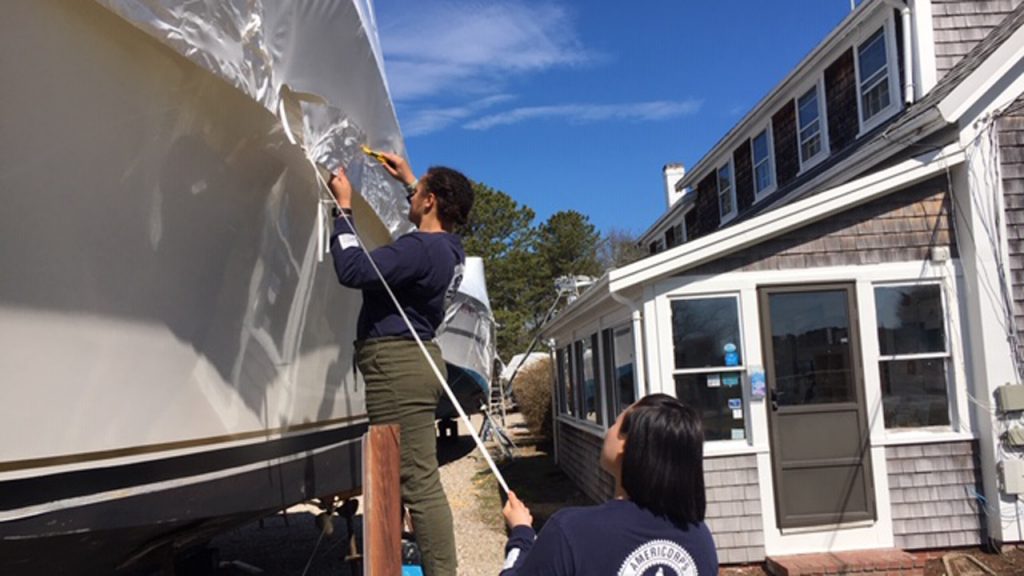Recycle Your Boat Wrap the Easy Way on Cape Cod

From April 1 to July 31, 2025, Cape Cod boaters and marinas can recycle shrink wrap hassle-free—thanks to Cape Cod Cooperative Extension and WHOI Sea Grant.
March 28, 2025 – April 1 marks opening day for boat shrink wrap recycling across Cape Cod. This year, the popular Cape-wide program will extend its collection season by one month, to accommodate boaters through the month of July. Last year, this program kept more than 46 tons of single-use plastic out of the waste stream.
2025 Program Changes
In past years, residents, small boatyards and marinas could recycle wrap for free, with the cost of recycling generously covered by the participating towns.
“The towns have been paying to recycle the wrap, which was critical to getting this program established. But budgets are tight, and the towns need to cut back,” says Kari Parcell, the solid waste coordinator for Barnstable County’s Cape Cod Cooperative Extension, who works with WHOI Sea Grant and the five participating towns to run the program.
This year, the program is still free for residents, but businesses will be charged in the locations that accept the wrap. Cape residents can bring their clean shrink wrap to transfer stations in Bourne, Falmouth, Chatham, and Wellfleet for free. The Eastham collection is free for town residents and $10 for non-residents.
Boat yards, marinas and yacht clubs will be charged for recycling clean wrap at the transfer stations in Bourne, Eastham, and Chatham. Falmouth is not accepting wrap from businesses. Businesses based in Provincetown, Truro and Wellfleet can recycle wrap in Wellfleet for free. All the location details, hours and fees can be found on the WHOI Sea Grant webpage (seagrant.whoi.edu/shrinkwrap).
“We are encouraging boat yards and marinas to work directly with their trash haulers to recycle clean shrink wrap,” says Parcell. “Our program has made this easier by identifying a local recycler who will accept the wrap. Businesses and haulers can reach out to us for help in putting their recycling system in place.”
Keep it clean
Boat shrink wrap is made from a type of plastic that can be recycled and turned into other plastic products like trash bags, coffee can lids and other items. However, it requires special processing and cannot be put into curbside recycling carts and bins.
“One of the biggest ways boat owners can help this program is to make sure their shrink wrap is free of any non-shrink wrap material before they recycle it,” says Stephanie Murphy of WHOI Sea Grant. “This includes things like plastic strapping, vents or zippered doors, which are considered contamination by recyclers.”
An easy way to the wrap from the boat to remove the strapping and other contaminants in the process is to cut the wrap around the belly of the boat. The straps fall away and the plastic can then be folded and rolled for recycling.
A how-to video is available on the WHOI Sea Grant website along with other information about how to prepare the wrap for recycling. The site also includes a video describing how to re-use shrink wrap for multiple seasons – something boaters may not know is possible and can save them money.
More information about the Cape Cod Shrink Wrap Recycling Program is available at http://seagrant.whoi.edu/shrinkwrap.
Contact: Stephanie Murphy, samurphy@whoi.edu
ABOUT WHOI SEA GRANT
Based at Woods Hole Oceanographic Institution, the WHOI Sea Grant program encourages environmental stewardship, long-term economic development, and responsible use of the nation’s coastal and ocean resources. The program supports research and education, and an extension program in collaboration with the Cape Cod Cooperative Extension. It is part of the NOAA-funded National Sea Grant College Program, a network of 34 individual programs located in each of the coastal and Great Lakes states. More information can be found at seagrant.whoi.edu.
ABOUT CAPE COD COOPERATIVE EXTENSION
Cape Cod Cooperative Extension is the education department for Barnstable County. Educational programs focus on agriculture, marine resources, horticulture, aquaculture, natural resources, water quality, recycling, household hazardous waste, nutrition, food safety, youth development, and the county’s environmental education issues. Extension programs are conducted in Barnstable County in cooperation with the University of Massachusetts and The Woods Hole Oceanographic Institution–Sea Grant program. Learn more at www.capecod.gov/extension.
